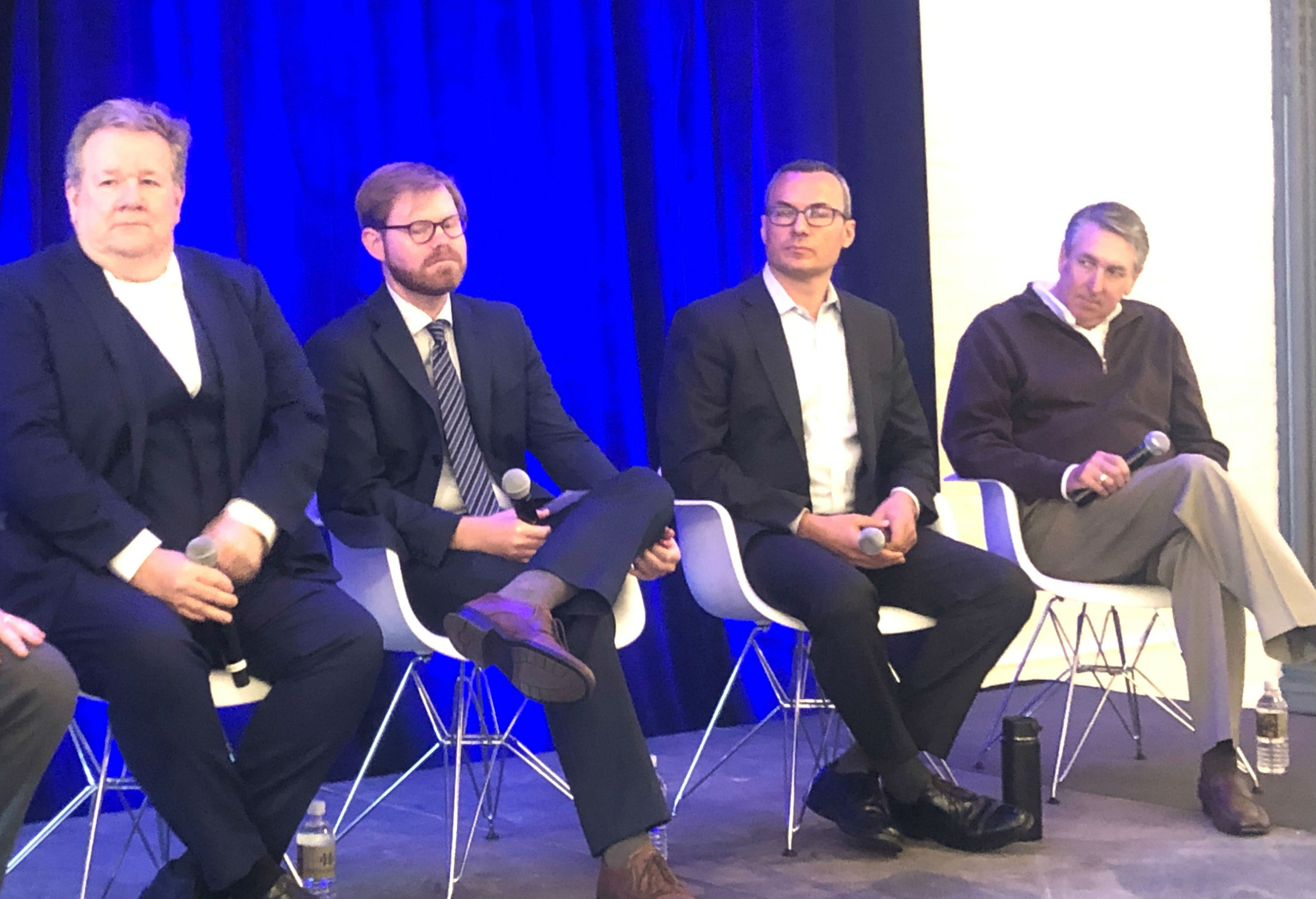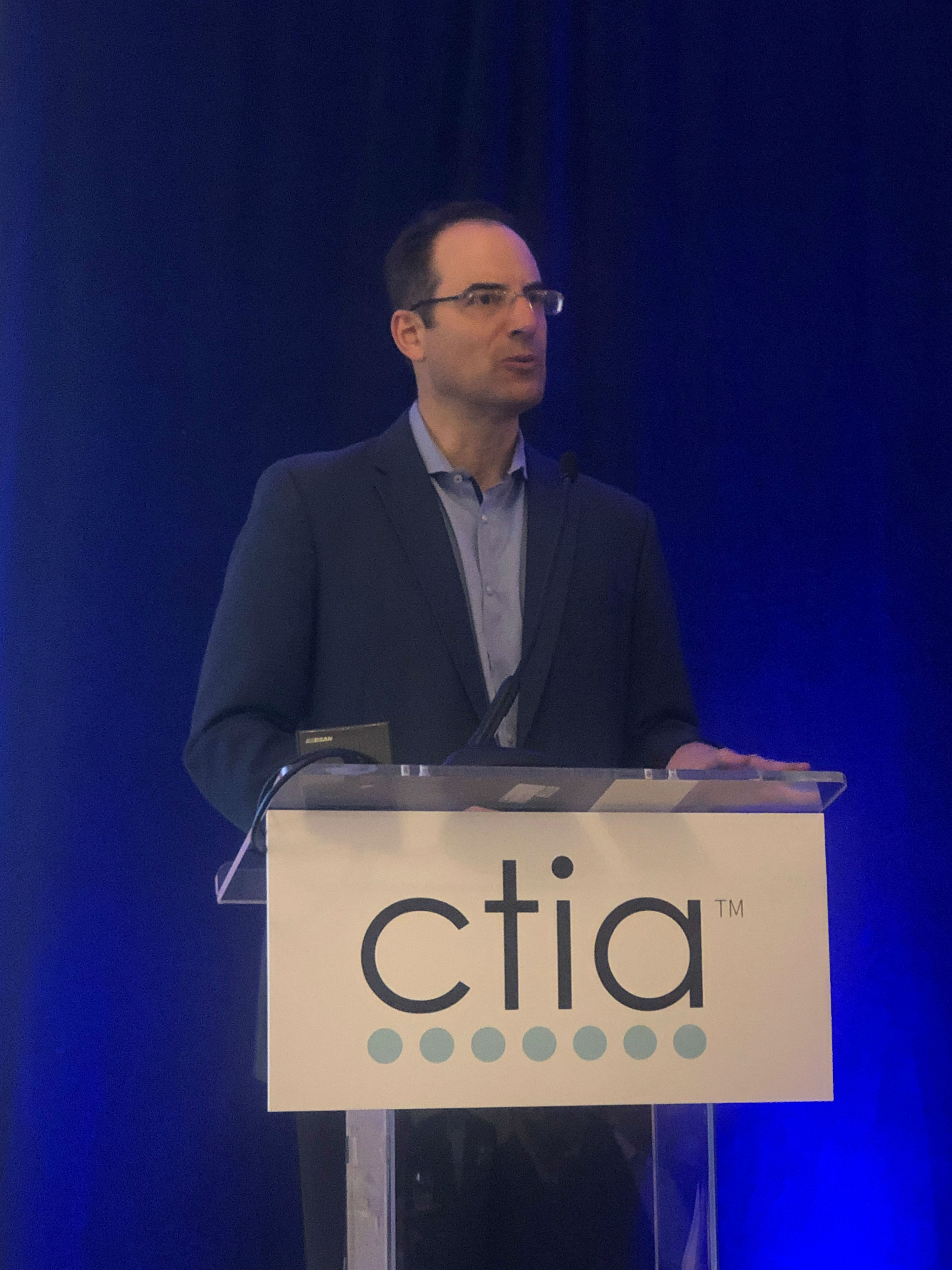DENVER — While municipalities across Colorado and the nation are lining up to compete against the private sector in internet services, those involved in the race to get 5G launched say fiber optic broadband will be left behind once full roll-out of the latest in wireless technology is complete.
“5G is going to be a game-changer,” said Nick Ludlum, Senior Vice President and Chief Communication Officer for CTIA, which is a trade association representing the wireless communications industry in the United States. “From driverless cars to advancements in health care to (augmented reality/virtual reality) and smart cities. The innovations of the future will be built on 5G.”
Ludlum was speaking to a small group of attendees at an event recently in Downtown Denver on the topic. It was co-sponsored by the Denver Chamber of Commerce and CTIA. It was designed to give industry insiders updates on the timeline and other issues involving 5G. It came at a time when municipalities are trying to sell their constituents on fiber optics.
5G went live in Denver in June of this year with the cooperation of the City and County of Denver. Mayor Michael Hancock said at the time it would put Denver on the leading edge of technology. Early estimates claim Denver will benefit by more than $575 billion in economic impact and create more than 70,000 new jobs.
Ludlum said 5G will be 100 times faster, handle 100 times more devices and be 5 times more responsive than today’s networks.
Experts say 5G wireless is the wave of the future because consumers are turning away from hard-wired internet and turning to mobile devices more and more for everything from personal to professional — and even medical — use.
Tom Power, Senior Vice President and attorney for CTIA pointed out that the 2018 mobile data consumption in the US was 74 times that of 2010.
Yet, municipalities like Longmont, Fort Collins and Loveland, which have financed millions in new fiber optic networks continue to tell their constituents that fiber is the wave of the future and that 5G will depend on those lines to operate.

Although 5G’s dependence on fiber optic lines is true, who supplies that portion of the technology is up for debate, with supporters saying the internet is a basic right for all to survive in today’s world, and opponents saying it’s not the role of government.
Municipalities offering broadband service is relatively new. It was born from a 2005 bill that the Colorado Legislature passed that prohibited local governments from using taxpayer dollars to build broadband networks.
That bill included a provision that allowed cities and towns to opt-out of the legislation via local voter approval. The first communities to exercise that and get in the business have mostly been high-density urban areas like Longmont, Centennial, Fort Collins, Loveland, and now possibly Greeley. Their reasons, they say, are public dissatisfaction of providers such as Comcast and Century Link and a growing need for everyone to have access to the internet — calling it a basic utility — while promising to offer packages it at reduced prices to those who can’t afford it.
However, opponents of municipal broadband say the idea behind the opt-out was to allow rural communities to put the infrastructure in place that private enterprise can’t for economic reasons.
They say buildout in metropolitan, urban areas is a waste of taxpayer money because of the emerging 5G technology. They also point to programs by private industry that offers internet service for as low as $10 a month, such as Comcast’s Internet Essentials and Century Link’s Internet Basics.
Longmont, which led the way in 2011 and borrowed, with voter approval, about $50 million initially to lay the fiber, continues to be held up to a high standard, but there are signs the city is struggling five years in.
Other communities have had to invest much more. Fort Collins, also with voter approval, bonded nearly $150 million, while Loveland bonded just under $100 million, but did so without asking voters.
All three communities leveraged their electric utilities to secure the loans. If the broadband utility fails, electric customers will be on the hook for the bill, regardless of whether they were broadband customers.
Greeley is in a different situation. It does not have an electric utility to leverage and it could cost upwards of $180 million to build out the city. It is still unclear how Greeley would pay for the service.
At issue, is how 5G will be delivered. Unlike 4G which can span miles between the cells used to deliver the frequencies, 5G will require lots of smaller cells closer together situated on tops of light posts or sides of buildings.
Fiber optic lines supply what is known as “the last mile” or the final section that will deliver 5G into a building. Municipalities think they can supply those lines and compete for internet business at the same time to produce more revenue.
Loveland City Councilman Don Overcash compares it to a highway that private industry can lease to continue to supply their products, which would, in turn, give people even more choices and lower prices.
“The fiber laid today is the foundation of the future of technology and needs taken care of regardless,” said Overcash in a previous Complete Colorado story. “You have to build the highway regardless of if the vehicles will change. The investment in fiber is going to ensure that we can capitalize on technology to keep going forward.”
Greeley’s Brian Sullivan, who’s heading up that process, agreed, telling Complete Colorado the fiber being laid in Greeley will also possibly be leased out.
However, those companies are already in agreements with the major players in 5G. Comcast partners with Verizon, and Dish Network just announced a partnership with T-Mobile.

Colorado Attorney General Phil Weiser told the group the best scenario is that governments commit to moving ahead with a wireless broadband ecosystem and not look at the new technology as a way to make money.
“We know that means we have to site more towers and more facilities,” Weiser said. “And how do we do that in a way that works best for our community … Not look at infrastructure as ‘oh let’s get as much revenue from this as possible.’ ”
Managing Director of Strategy and Network Partnership Development for Verizon Wireless Daniel Feldman said 5G is coming with or without municipalities already having the infrastructure in place because it is a “necessary technology.” More than 20 billion devices are predicted to go wireless by the end of 2020. Verizon Invests $17 billion a year in infrastructure to handle that load, he said.
“Just thinking of the volume of devices that are coming on the network and then think of the way that people are using these devices,” Feldman said. “Data use is increasing exponentially with streaming Netflix and high-resolution pictures and videos.”
Overcash and Sullivan’s idea that municipal fiber lines can be leased to wireless carries comes with no guarantees, and taxpayers may be left holding the bag if the municipal broadband utility fails, opponents say.
In fact, wireless providers are likely to never lease city-laid fiber, they say, because unless the infrastructure is installed, owned and operated by the wireless provider, there is no way to guarantee service levels to consumers.
Where cities need to be focused on negotiations is in locations for the 5G small cells that will need thousands of locations nationwide to operate efficiently, industry leaders said.
“The model we have with cities can’t be the same as we had with macro towers because of the volume of devices,” said Feldman, who role with Verizon is to negotiate cell locations and fiber installation. “There is a large volume of them, and every one of them requires fiber, and that is very disruptive to cities. In some cases, we have to rip up streets to put that fiber down. … There is a struggle with the cities from a cost perspective, from a city resource perspective in getting this much fiber put into the ground in the time limit were trying to do it in.”
Weiser summed it up by saying the relationships between governments and the new 5G technology is complicated. He urged thoughtfulness as the new technology takes shape, pointing out two of the biggest concern’s municipal broadband opponents’ cite as well.
“We can create some real harms if we’re not careful about things like data security and privacy,” Weiser said. “What governments also have to have a dialogue with industry about is this concept of a social license to operate. It’s really important that we don’t get into a world where each party looks to just leverage their legal rights.”



Pingback: Consumers moving away from hardwired internet; 20 billion mobile devices online in the next year – Complete Colorado – Page Two – NoobZone
Pingback: Consumers moving away from hardwired internet; 20 billion mobile devices online in the next year – Complete Colorado – Page Two - JustWowMeHub
Pingback: Consumers moving away from hardwired internet; 20 billion mobile devices online in the next year – Complete Colorado – Page Two – Bitfirm.co
Pingback: 5G experts: Consumers moving away from hardwired internet; 20 billion mobile devices online in the next year – Complete Colorado | UniversalTechNews.com